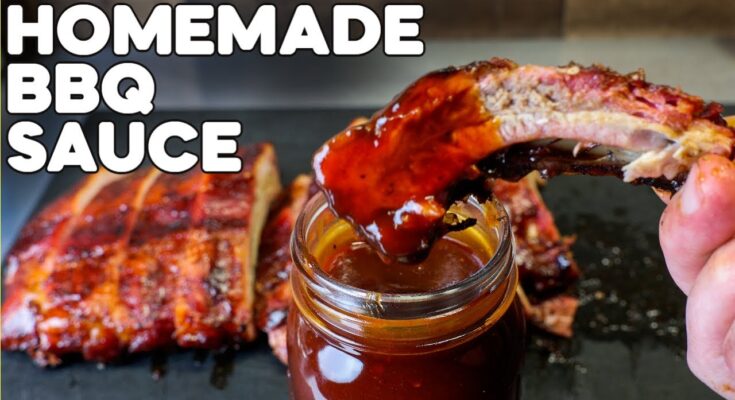BBQ Sauce Recipe: BBQ sauce is an essential part of any grilling experience. With its rich blend of sweetness, tang, and spice, this sauce adds depth and complexity to meats, vegetables, and even certain sides. Making BBQ sauce from scratch gives you the freedom to adjust flavors, balance the sweetness, and create something that perfectly complements your culinary style.
Whether you’re looking for a smoky, spicy kick or a sweeter, milder taste, this guide will walk you through the process of making a classic BBQ sauce and give you tips for customizing it to suit your preferences.
Ingredients Needed
Here’s what you’ll need to make a delicious homemade BBQ sauce:
Common Ingredients
- Tomato sauce or ketchup – 1 cup (base for the sauce)
- Apple cider vinegar – 1/2 cup (for acidity and tang)
- Brown sugar – 1/4 cup (for sweetness)
- Molasses – 2 tbsp (adds depth and rich sweetness)
- Smoked paprika – 1 tsp (for smoky flavor)
- Garlic powder – 1 tsp
- Onion powder – 1 tsp
- Salt and black pepper – to taste
Optional Ingredients for Flavor Variations
- Worcestershire sauce – 1 tbsp (for umami richness)
- Hot sauce – 1 tsp or to taste (for heat)
- Honey – 1 tbsp (for extra sweetness)
- Liquid smoke – 1/2 tsp (for additional smoky flavor)
Feel free to adjust quantities or omit ingredients based on your taste preferences!
Essential Tools for Making BBQ Sauce
- Saucepan or Pot: To cook and combine ingredients.
- Whisk: For mixing the sauce thoroughly.
- Measuring cups and spoons: Ensures accurate measurements for consistent flavor.
- Spoon or ladle: For stirring and tasting the sauce.
Step-by-Step Guide to Making BBQ Sauce
Step 1: Prep Your Ingredients
Before you start cooking, gather all your ingredients and measure them out. This will make the process smoother and ensure everything is ready when needed.
- Tip: For fresh ingredients like garlic or onion, you may want to mince them finely. This will enhance the flavor and allow them to blend into the sauce without large chunks.
Step 2: Sauté Aromatics (Garlic & Onion)
Starting by sautéing garlic and onion, if using fresh, can elevate the depth of flavor in your BBQ sauce.
- How to Sauté: Heat a bit of oil (around 1 tbsp) in your saucepan over medium heat. Add the minced garlic and onion and cook for about 2-3 minutes until they become fragrant and start to soften.
- Tip: Avoid high heat, as garlic can burn easily, giving the sauce a bitter taste.
Step 3: Add the Base (Tomato Sauce/Ketchup)
The base of most BBQ sauces is either tomato sauce or ketchup. This ingredient provides the core flavor, thickness, and color of the sauce.
- Tomato Options: You can use tomato sauce for a purer, more subtle taste, or go with ketchup for a pre-seasoned base that adds a bit of sweetness and tang.
Step 4: Sweeten It Up
Adding sweetness is crucial to balancing out the acidity and spice in BBQ sauce. Common sweeteners include brown sugar, molasses, or honey.
- Brown Sugar and Molasses: Brown sugar and molasses work well together, giving a dark, rich sweetness that complements smoky flavors.
- Adjusting Sweetness: If you prefer a milder sweetness, you can add less brown sugar or substitute with honey for a lighter, floral sweetness.
Step 5: Add Vinegar and Other Acids
Vinegar is essential in BBQ sauce for its tanginess, which balances the sweet and smoky elements.
- Vinegar Options: Apple cider vinegar is popular because it adds a mild, fruity tang. White vinegar is sharper, while balsamic vinegar adds richness.
- Other Acids: Lemon juice or a splash of orange juice can add brightness and additional layers of flavor.
Step 6: Incorporate Spices and Seasonings
To give BBQ sauce its characteristic warmth and depth, add spices like paprika, chili powder, and garlic powder.
- Common Spices: Smoked paprika, garlic powder, and onion powder are must-haves for a classic BBQ flavor.
- Adjusting Spice Level: If you like a spicier sauce, increase the chili powder or add a dash of hot sauce.
Step 7: Simmer and Stir
Once all the ingredients are combined, bring the sauce to a gentle simmer. Simmering helps the flavors meld and intensifies the sauce.
- How Long to Simmer: Cook on low heat for 15-20 minutes, stirring occasionally to prevent sticking.
Step 8: Taste Test and Adjust
Once the sauce has simmered, taste it and adjust as needed. You can add more sugar for sweetness, vinegar for tanginess, or spices for a stronger flavor.
Step 9: Thicken or Thin the Sauce as Needed
Depending on your preference, you may want to adjust the consistency.
- To Thicken: Let it simmer longer, or add a cornstarch slurry (1 tsp cornstarch mixed with water).
- To Thin: Add water or a splash of vinegar.
Step 10: Cool and Store the BBQ Sauce
Allow the sauce to cool to room temperature, then store it in an airtight container in the fridge. It will last about 2 weeks.
Flavor Variations to Try
Experiment with different ingredients for unique flavors:
- Smoky BBQ Sauce: Add extra smoked paprika and a drop of liquid smoke.
- Spicy BBQ Sauce: Increase chili powder or add cayenne pepper.
- Fruity BBQ Sauce: Blend in puréed pineapple or peaches.
Serving Suggestions for BBQ Sauce
BBQ sauce pairs beautifully with:
- Grilled Meats: Chicken, ribs, or pork.
- Vegetables: Roasted or grilled veggies.
- As a Dip: Perfect for chicken tenders, fries, or onion rings.
- In Sandwiches: Brings a great flavor to burgers and pulled pork sandwiches.
Tips for Customizing Your BBQ Sauce
To make your BBQ sauce unique, try these additions:
- Bourbon: A dash adds richness and depth.
- Coffee: Adds boldness and pairs well with beef.
- Fruit Puree: Pineapple, mango, or peach for a fruity twist.
Storing and Preserving Your BBQ Sauce
Making BBQ sauce in larger batches is a great idea since it stores well and you can enjoy it for weeks. Knowing how to store it properly ensures that you’ll always have fresh, flavorful BBQ sauce on hand.
Refrigeration and Shelf Life
Homemade BBQ sauce typically lasts about two to three weeks when stored in an airtight container in the refrigerator. Glass jars work particularly well for storage, as they keep the sauce fresh without absorbing any flavors or odors. Be sure to let your sauce cool completely before transferring it to your storage container to prevent condensation, which can thin the sauce over time.
Freezing BBQ Sauce for Long-Term Storage
If you want to store your BBQ sauce for longer, freezing is an excellent option. Pour the cooled sauce into freezer-safe containers or ziplock bags, leaving a little room for expansion. Properly frozen, BBQ sauce can last up to three months. When you’re ready to use it, thaw the sauce overnight in the fridge and give it a good stir before serving.
Creative Variations of BBQ Sauce
One of the greatest things about BBQ sauce is how versatile it is. Once you master the basic recipe, you can explore several flavor variations to suit different dishes and preferences.
Honey BBQ Sauce
For a sweeter, more mellow sauce, try using honey as the primary sweetener. Honey BBQ sauce pairs well with chicken and pork, adding a smooth, slightly floral sweetness that caramelizes beautifully when grilled. You can also add a little extra garlic or onion powder to complement the honey’s sweetness.
Spicy BBQ Sauce
If you love a bit of heat, a spicy BBQ sauce is the way to go. Add some chopped chipotle peppers in adobo sauce for a smoky, spicy kick, or stir in sriracha or cayenne pepper for more straightforward heat. This version is perfect for grilled ribs or brisket, giving them a fiery edge that balances well with the natural sweetness of the sauce.
Mustard-Based BBQ Sauce
Mustard-based BBQ sauce is a popular choice in South Carolina and offers a tangy twist compared to traditional tomato-based sauces. To make it, use yellow mustard or Dijon as the base instead of ketchup. This sauce pairs especially well with pulled pork and adds a sharp, savory note that’s a nice contrast to the dish’s richness.
Serving Suggestions for BBQ Sauce
BBQ sauce is incredibly versatile and works well with a variety of foods. Here are some top ways to use your homemade BBQ sauce beyond just grilling.
Pairing BBQ Sauce with Different Meats
BBQ sauce is a natural companion for meats like ribs, brisket, pulled pork, and grilled chicken. When used as a glaze, it helps create a delicious crust with a caramelized finish. For bolder meats like beef or lamb, consider a spicier or smoky BBQ sauce, while milder meats like chicken or pork work well with sweeter, tangier sauces.
BBQ Sauce as a Dip or Marinade
BBQ sauce is also great as a dipping sauce for foods like fries, chicken tenders, or even grilled vegetables. It can double as a marinade, too; simply coat your meat in BBQ sauce and let it marinate for a few hours before grilling or roasting. The sauce’s flavors will soak into the meat, creating a rich, savory taste from the inside out.
Common Mistakes to Avoid
Even though BBQ sauce is relatively easy to make, a few common mistakes can affect the final outcome. Here are some pitfalls to watch out for to ensure a flawless sauce every time.
Overcooking or Undercooking
When cooking BBQ sauce, it’s crucial to simmer it just long enough to allow the flavors to meld without drying it out. Overcooking can make the sauce too thick and can lead to a bitter, burnt taste, while undercooking can leave it runny with raw flavors. Stick to the recommended cooking time and stir often to maintain the right consistency.
Adding Too Much Sugar or Salt
BBQ sauce should strike a balance between sweet, savory, and tangy flavors. Adding too much sugar can make the sauce overly sweet, while too much salt can overwhelm the other ingredients. Always start with a little less of each ingredient and taste as you go, adding more only if needed.
FAQs about BBQ Sauce Recipe
What ingredients do I need to make BBQ sauce?
Classic BBQ sauce typically includes ingredients like ketchup, brown sugar, vinegar, Worcestershire sauce, mustard, garlic powder, onion powder, and a touch of smoked paprika or liquid smoke for that signature flavor. Some recipes may include additional spices or unique twists, like honey, molasses, or even a dash of hot sauce for added kick.
How long does homemade BBQ sauce last?
When stored in an airtight container and refrigerated, homemade BBQ sauce generally lasts about 1-2 weeks. For longer storage, consider freezing it in small portions, which can keep for up to 3 months.
Can I make BBQ sauce without ketchup?
Yes! If you prefer a ketchup-free recipe, use tomato paste or pureed tomatoes as a base. Adjust the sweetness with brown sugar or molasses and balance it with vinegar and spices for a similar depth of flavor.
How can I make BBQ sauce spicier?
To add a spicy kick, mix in some cayenne pepper, hot sauce, or red pepper flakes. Adjust the amount based on your heat preference.
What dishes pair well with BBQ sauce?
BBQ sauce is a versatile condiment that pairs wonderfully with grilled meats like ribs, chicken, and pulled pork. It also works well as a dipping sauce for fries, a topping for burgers, or even a glaze for roasted veggies.
Conclusion
Making homemade BBQ sauce is easy and allows you to create a sauce that perfectly complements your dishes. With this step-by-step guide, you can experiment with flavors, adjusting sweetness, acidity, and spice to your liking.
Making BBQ sauce from scratch is a rewarding process that results in a rich, flavorful sauce customized to your taste. Experiment with ingredients, try different sweeteners, vinegars, and spices, and create a signature sauce that’s uniquely yours.
References
To ensure the authenticity and accuracy of this BBQ Sauce recipe, we’ve gathered references from trusted culinary resources and renowned chefs. These sources offer additional insights and techniques for perfecting BBQ sauce, allowing readers to explore diverse styles and flavors. For further reading, we recommend consulting these resources:
- Food Network – Known for its extensive recipe database, Food Network provides a variety of BBQ sauce recipes, including regional and unique styles.
- Bon Appétit – This publication shares expert tips on creating well-balanced BBQ sauces with the right mix of sweetness, acidity, and spice.
- Serious Eats – With a focus on cooking science, Serious Eats offers a deep dive into the chemistry behind BBQ sauce ingredients, helping home cooks achieve the best flavor.
- The Spruce Eats – This resource covers classic BBQ sauce recipes and step-by-step instructions, ideal for beginners and seasoned cooks alike.
By exploring these resources, you can broaden your knowledge of BBQ sauce techniques and variations, perfecting your own version at home.



